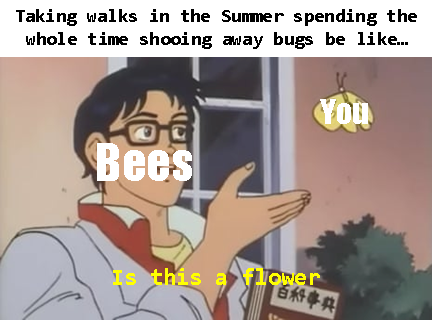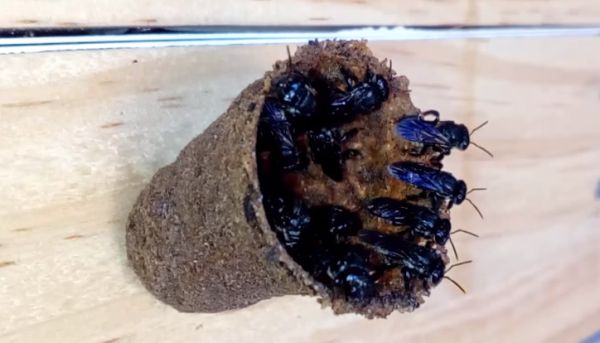They cut down on using pesticides which are harmful to bees in my area, so there's tons of honeybees and bumble bees buzzing about... Maybe they cut down on using those pesticides in yours? It makes me happy to see all the bees because without them, three quarters of crops which produce food for us wouldn't be viable! Respect the bees. 🐝
I haven't noticed, and was about to reply with a story about the declining bee population. But a quick Google search says that yes, the bees are back in town
Edited to a non-paywalled link:
https://finance.yahoo.com/news/hobbyist-beekeepers-buzzing-reversing-america-212213119.html
There's a WaPo article too for those who want that
A part of the problem is importing bees people think are "more efficient". The old reasoning was that American bees were clunky and not as rapidly efficient as European bees, so the latter were brought over, but not only did this cause the American ones to be threatened by competition but also that vegetation swayed in favor of what European bees preferred while things only American bees would've pollinated waned. It's those European bees who are hording after me while I'm outside.

Not so much bees, but I have noticed an uptick in fireflies the past few years which I have enjoyed.
Opposite situation here. I've seen literally 1 so far this year. A decade ago we would've been seeing thousands a night.
A decade ago I barely saw any. Two decades ago, there would be nights where you could see by the amount of light the absolute insane number of them would put out. Now, I'm seeing a decent amount, nothing like 20 years ago, but way better than it used to be.
I used to see them every year, but I haven't seen one in something like eight years now.
Yes, I've noticed those too. There are so many of those here it's like being inside a fantasy background.
No, but if you are, I’d call it an encouraging sign.
Sometimes I wish I wasn't so sweet :(
If you're getting them flying into your face or stinging you when you're not messing with their nest, it's very possible you're dealing with Africanized Honey Bees (AFBs). They're basically impossible to tell apart just by looking at them. Aside from genetic testing, you have to do it by behavior. Lots of little differences, but two more obvious ones are:
- They'll pretty much make a nest in any kind of a hole, including in the ground, while European bees like larger cavities in walls or hollow trees.
- They defend their nests much more aggressively and at a greater distance. They'll fly up to your face, and tend to sting much more liberally (European bees rarely sting unless you try to squash them or actively threaten their nest).
The ones I deal with only ever stung/bit me twice despite dealing with them all year by the minute. Do the stings/bites have any difference? My thumb feels felt like it got a flu shot jab, but it didn't hurt after five minutes except for a very mild flu shot kind of soreness. No stinger in the skin either, at least none I can see.
I don't believe there's a venom difference. They got called "killer bees" because they tend to swarm people much more often than European, not because an individual sting is worse.
With that reaction, and no stinger, are you sure it was a honey bee? They pretty much always leave a stinger.
There's a tiny, tiny black spot on my thumb, like the size of a dust mite due to how small it is. I'm lucky with my glasses I can even see it, but I don't know if that's the stinger or just a dent it left. The bee did fly away unharmed afterward.
It sounds like the stinger did not come out when you were stung, so you were probably stung by a wasp rather than a bee.
Well shoot, I always was taught wasps were the ones I should be worried about health-wise. Seeing this to be wrong, now I'm having thoughts.
When the stinger comes out, it's basically the whole back end of the bee. It's kind of fiendish: the venom sack and a little muscle are in the very end of their butt. The stinger has a barb, so when they stick it in you, and you brush them off, the whole assembly rips off the bee and the muscle keeps pumping the venom into you. The bee dies.
So it's very obvious if the stinger came off.
Also, most people in the US think that yellow jackets are bees when they are in fact wasps. So it could be a wasp that stung OP.
For sure could be. They don't leave their stingers, they hurt like hell, and they're complete assholes.
Complete asshole almost always means yellow jacket.
I wonder if this is related to the fact that I've seen quite a bit more native bees in my neighbourhood. (I'm in South America mind you.) And people freaking out because they look like wasps.
Are they friendly/nonvenomous down there?
I believe that most of the native species here don't even sting, and if you annoy them they'll flock around you and... that's it, like a bunch of kids calling you meanie. Or at least the ones that look like wasps, like this:

I've seen quite a bit more of those this winter.
How do they defend a hive if not for the ability to sting?
They* technically can bite you, but the bite doesn't hurt, so it's likely only effective against other really small critters. They can also release some sort of glue, kind of annoying if they do it while tangling in your hair, but harmless.
I wonder if their visual similarity to wasps isn't some form of defence on its own, as mimicry. They also seem to build nests in places where they won't get into trouble with mammals, like inside the hollows of tall trees. And that opening "tube" is closed off at night.
*from some websearch I could find one slightly more dangerous species, called "tataíra" or "abelha de fogo" (lit. fire bee). Even then it's just spitting formic acid, like ants would; and mostly used not against larger critters, but while pillaging beehives of other species.
I have because my garden is booming and they’re loving it
What are they attracted to the most?
flowers
Well I knew that, but I mean what kind? Do they have preferences?
To some extent it depends on the species of bee. There are over 6000 species of bee in N. America. Planting for the benefit of bees is a thing, tho'. Honey bees are but one specie, and not native.
https://www.gardendesign.com/flowers/bees.html
https://learnbees.com/best-flowers-for-bees/
https://www.countryliving.com/gardening/g32157369/flowers-that-attract-bees/
https://www.epicgardening.com/pollinator-garden-plants/
I've not vetted the above sites, but they should be sufficient to get your started on 'planting for pollinators.' It's not just about bees, there are many species that have symbiotic relationships with flowering plants.
Your's was a 'small question' about which which volumes been written. Generally it's best to plant native species of plants to attract pollinators in your local area. If you talk to a local greenhouse/ garden center, and/or master gardener's in your area that would also be helpful.
Bees are most attracted to purple/violet/blue flowers.
Maybe it's my hair that attracts them then.
When I wear a red or orange shirt and sit outside, hummingbirds tend to come check me out. I wouldn't be too surprised if the same thing can happen with bees trying to figure out whether you're full of delicious nectar.
It helps if you already have hummingbirds in the area. But yeah, I've gotten a handful of hummingbirds pretty used to hanging out around me, along with a few other species (I even had a spotted towhee eating from my hand before I had to move).
Set up a feeder for them along with flowers (the trumpet-shaped types so that they can fit their weirdo tongues in there), start watching them where they can see you, and there's a pretty good chance you'll get them to hang out and relax even with you right there. As much as a hummingbird ever relaxes. Then they might come right up to you when you're wearing red or bright orange.
For songbirds, a suet feeder is pretty great for drawing them close.
They are all over my dill after it bolted and flowered
Hmm... that might explain things. There's dill everywhere here.
Bees specifically? Or do you mean wasps and hornets? I haven't seen a bee in literal years, maybe since I was a kid. Wasps and other fuckers are annoyingly common enough. I have some in the back of my place. I can't even leave the window open for fresh air because they are somehow able to sneak in through the screen (I can't discern visible holes in the screen).
Yes, European bees to be specific (though not actually in Europe, European bees are just an invasive species here because people thought they'd be more productive than local bees if brought over, with the American bumblebee being endangered). If I was dealing with wasps, I'd probably be in much bigger trouble being stung/bitten, though fortunately the ones I deal with are more like flu shots when they strike, and I'm not allergic.
I drive the same way on holiday every year. I noticed that, for the first time in recent years, there's a massive uptick in insects on the windscreen this year. Might be because it's cooler and insects living in a lower air layer.
Lucky you, it's been hot for us in the snow belt. Another reason I'd trade places with someone.
Bees? I wish. I've seen an increase in wasps.
It's expected, though. They love warm weather. We're going to keep seeing an increase in wasp populations with climate change.
Ironically haven't seen an increase in wasps. Or at least that I know of, they always look just like European bees. None look like how I'd expect wasps to look.
Because of the heat, I at one point wondered if maybe they were attracted to my sweat.
Casual Conversation
Share a story, ask a question, or start a conversation about (almost) anything you desire. Maybe you'll make some friends in the process.
RULES
- Be respectful: no harassment, hate speech, bigotry, and/or trolling
- Encourage conversation in your post
- Avoid controversial topics such as politics or societal debates
- Keep it clean and SFW: No illegal content or anything gross and inappropriate
- No solicitation such as ads, promotional content, spam, surveys etc.
- Respect privacy: Don’t ask for or share any personal information
Related discussion-focused communities